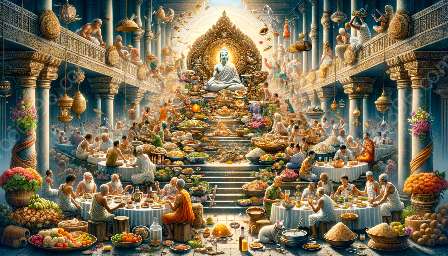Religious festivals and celebrations play a significant role in societies around the world, bringing people together to commemorate and express their faith. Food, as an essential element of human life, is deeply intertwined with these religious events, influencing cultural traditions, culinary practices, and historical narratives.
Understanding the Role of Food in Religious Festivals and Celebrations
Food holds symbolic and practical importance in religious festivals and celebrations. It serves as a means of expressing devotion, fostering community, and preserving cultural heritage. Different religious traditions have their own unique ways of incorporating food into their spiritual practices, often reflecting historical, geographical, and social influences.
Connection to Food in Religious Practices
Food is a central component of religious practices across diverse faiths. Religious rituals often involve specific food offerings, dietary restrictions, and communal meals that hold spiritual significance. These practices not only highlight the relationship between food and faith but also shape cultural identities and values.
Food Culture and History: A Reflection of Religious Festivals and Celebrations
The role of food in religious festivals and celebrations has left a lasting impact on food culture and history. Through traditional recipes, culinary techniques, and culinary symbolism, religious food practices have shaped the way communities prepare, consume, and understand food. These influences have contributed to the rich tapestry of global food culture.
Food in Different Religious Festivals and Celebrations
Across various religious traditions, food plays a central role in commemorating significant events and expressing spiritual devotion. Let's explore how different religions integrate food into their festivals and celebrations.
Christianity
In Christianity, food is often associated with the celebration of key religious observances such as Christmas and Easter. Traditional dishes like hot cross buns and roast turkey hold symbolic meanings, representing spiritual themes of sacrifice, resurrection, and communal fellowship. Communion rituals also involve the symbolic consumption of bread and wine, embodying the central tenets of the faith.
Islam
In Islam, the month of Ramadan holds immense significance, marked by fasting from dawn to sunset. The daily breaking of the fast, known as iftar, is a communal and joyous occasion characterized by the sharing of dates, fruits, and refreshing beverages. The festive culmination of Ramadan, known as Eid al-Fitr, is marked by lavish feasts and the exchange of special sweet treats, signifying the end of the fasting period.
Hinduism
Hindu festivals such as Diwali and Holi are marked by an array of traditional sweets, savory snacks, and elaborate feasts. These delicacies are often prepared with intricate recipes and hold deep cultural and religious significance. Offerings to deities, called prasad, are an integral part of Hindu worship and are distributed to devotees as a symbol of divine blessings.
Judaism
Jewish festivals, such as Passover and Hanukkah, are celebrated with traditional dishes that reflect historical narratives and religious symbolism. Matzah, a unleavened bread, is a central element of Passover, recalling the Israelites' exodus from Egypt. On Hanukkah, oil-based dishes like latkes and sufganiyot are enjoyed to commemorate the miracle of the temple's sacred oil.
Impact on Food Culture and History
The influence of food in religious festivals and celebrations extends beyond the spiritual realm, shaping culinary traditions, agricultural practices, and cultural landscapes. Through the passage of time, these food traditions have become integral to regional cuisines and societal customs, contributing to the diversity and richness of food culture and history.
Preservation of Culinary Heritage
Religious festivals and celebrations often serve as crucial guardians of culinary heritage, preserving traditional recipes, culinary techniques, and cultural rituals that have been passed down through generations. These practices not only sustain cultural identity but also offer insights into historical foodways and agricultural practices.
Interplay of Cultural Exchange
Religious festivals and celebrations provide opportunities for cultural exchange, fostering interactions between different communities and enabling the sharing of culinary practices. This interplay of traditions contributes to the dynamism of food culture, enriching culinary landscapes with diverse flavors and culinary innovations.
Conclusion
Food's role in religious festivals and celebrations is a testament to the profound connections between food, faith, and cultural identity. The interweaving of food in religious practices has left an indelible mark on food culture and history, shaping the way societies commune, celebrate, and sustain their culinary traditions.

